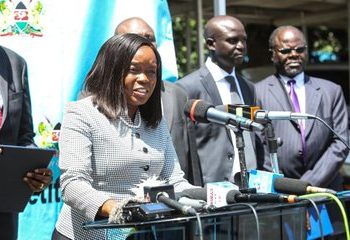By Jepkemei Kibet
Kenyans are now able to access information on prevention, management and care of non-communicable diseases (NCDs) on their mobile phones.
This has been made possible through Fafanuka, an initiative by the Health Ministry in collaboration and Non-Communicable Diseases Alliance of Kenya (NCDAK) in partnership with Safaricom aimed at addressing the information gap.
The platform provides information and facts on Diabetes, Heart diseases, Cancer, Epilepsy and General NCDs.
The 24-hour service can be accessed by all Safaricom users by dialing *215# at a cost of one shilling per SMS per category subscribed to per day.
Messages will be received every Monday to Friday.
Information provided will also include where to go for treatment including public, faith-based, private and other health facilities.
The initiative originally started off as M-Kifafa, a mobile phone epilepsy information service developed in partnership with the Kenya Association for the Welfare of People with Epilepsy (KAWE).
However, there was need to include more than one Non-Communicable disease, leading to the development of Fafanuka.
The initiative was launched during the Word diabetes Day in Vihiga County in November.
Fafanuka leverages on SMS and USSD to educate the public, patients, families, nurses, Community Health Workers and caregivers on healthy living, prevention and management of various non-communicable diseases including diabetes, cardiovascular diseases, cancer and epilepsy.
According to Head of Non-Communicable Diseases Division at the Ministry of Health Dr Joseph Kibachio, it also provides information on healthy living and health promotion.
He said access to accurate information on NCDs will facilitate increased awareness of the diseases among community members, dispel myths and reduce stigmatization of people living with NCDs.
Awareness of NCDs and their signs and symptoms seeks to motivate community members to screen for early detection and treatment.
Additionally, access to information on risk factors for NCDs and lifestyle modification required to prevent or manage NCDs should motivate community members to adopt healthy lifestyles.
He added that increased community awareness of NCDs prevention and management should thus contribute to reducing the NCD burden in the country.
Safaricom Foundation in partnership with the Kenya Diabetes Management and Information Centre have held medical camps throughout the country over a 10 year period.
Safaricom, Head of Corporate Responsibility Sanda Ojiambo noted that as each year progressed, thousands of people who came to the medical camps were suffering from ailments that were mainly non-communicable, preventable or were related to their lifestyles.
“It was evident that diabetes, cancer, heart disease and epilepsy do not discriminate according to age, income level or county,” said Ojiambo.
Ojiambo concluded that Safaricom simply provides a platform to deliver valuable information contributing to improved health and wellbeing while saving lives.
The content has been developed in partnership with various organizations who are part of NCDAK including: Kenya Cardiac Society (KCS), Kenya Network of Cancer Organizations (KENCO), Kenya Welfare of People with Epilepsy (KAWE), African Institute for Health and Development (AIHD) and the Kenya Diabetes Management and Information Centre (DMI Centre)















